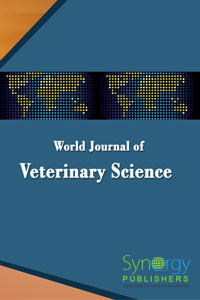
Effect of Xylanase Application to Rapeseed Cake Diet on Digestibility and Deposition of Nutrients and Energy in Young Broiler Chickens Pages 18-24
Teresa Banaszkiewicz
Siedlce University, Nature Faculty, Prusa 14, 08-110 Siedlce, Poland
DOI: http://dx.doi.org/10.12970/2310-0796.2013.01.01.4
Download PDFAbstract: Two experiments were conducted to study the effect of rapeseed cake and xylanase application on the digestibility and deposition of nutrients and energy in young broiler chickens. Experiment 1 was carried out on broiler chickens between the ages of 1 to 21 days, which were divided into three groups. The control diet contained soybean meal, whereas in the experimental diets a part of the soybean meal was replaced by 15% of rape cakes. Furthermore, an exogenous enzyme preparation containing xylanase in the amount of 0.2g kg-1 was added to one of the two rapeseed cake diets. Seven 1-day-old chickens at the beginning of the experiment and 6 chickens on day 21 of the experiment were slaughtered in each group and the chemical composition of their bodies was analyzed. In experiment 2, a digestibility test of the diets from experiment 1 was carried out on 2-week-old broiler chickens. The application of 15 % rapeseed cakes and the addition of the enzyme preparation did not significantly influence body weight, feed intake, the chemical composition or the energy content in the chickens, bodies. Differences in the digestibility of the dry matter , ether extract , and crude phosphorus of the diets were statistically significant. The highest digestibility of dry matter, ether extract, and crude phosphorus(P<0.05) was found in the control group. Application of xylanase into the diet containing rapeseed cake increased the digestibility of nutrients, but the differences obtained between the groups were not significant.
Keywords: Rapeseed cakes, enzyme preparation, broilers, apparent digestibility, carcass retention. Read more
